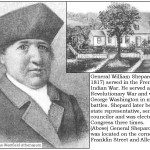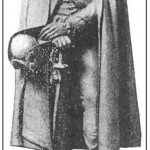July 4th, 1776: The American colonies commit treason against England by signing the Declaration of Independence. The Revolutionary War would last over eight years, from the battle of Lexington and Concord on April 18th, 1775 to the Treaty of Paris on September 3rd, 1783. Through these years, the town of Westfield sacrificed many resources and soldiers for the cause.
Westfield’s population at the time was less than 2,000, and there were around 300 men who served in the war. Out of these men, only five died while in service.
Eldad Taylor, descendant of Westfield’s first reverend Edward Taylor, wrote a letter to his wife in March of 1776 and mistakenly believed that the British were leaving the colonies permanently:
“My Dear, This Morning opens with much news. No doubt but it will be pleasing to you and all friends, to have ye most authentik account posseable. The…Vermin left Boston yesterday morning in…confusion and ye town is now open…last Saterday night our forces took possession of a small hill near Boston…Caused ye Regulars to fire at them all night but without any hurt to any of our men except one…
“The Tories are [gone off] with ye Regulars except a few…They say that the [Tories] about in a [fortnight] ago was in high spirits encouraging ye troops that they should be soon Masters of America but when ye orders were given to prepare to sail they were [struck] with Paleness and astonishment…I am as always your comfort Eldad Taylor.”
Westfield’s most notable soldier from the Revolutionary War was General William Shepard. Having served previously in the French and Indian War, history first remembers Shepard as a young lieutenant who fought valiantly in the Battle of Ticonderoga in 1758. By 1759, Shepard became a captain with his own company. Entering the Revolutionary War with a rank of Lieutenant Colonel, Shepard was soon promoted to a General.
After the war, General Shepard retired from military life for a short time. He was soon asked to become a part of the state legislature, and in 1786 he was appointed Major General of the 4th division of the State Militia. In this year, he played a major role in subduing those who participated in Shays’ Rebellion at the Springfield Armory.
When the war concluded in 1783, the town held a Peace Festival on June 17th of that year. Many people from Westfield and surrounding towns in the Springfield area celebrated and dined together. To honor the freedom of the thirteen colonies, thirteen toasts were made with accompanying cannon blasts. Among the toasts were to the “dawn of peace,” the United States, the Continental Congress, the allies who served with America, “His Excellency General Washington,” and “the liberal and benevolent spirits on both sides of the Atlantic, who have lent their aid to rear up the glorious fabric of peace.”



